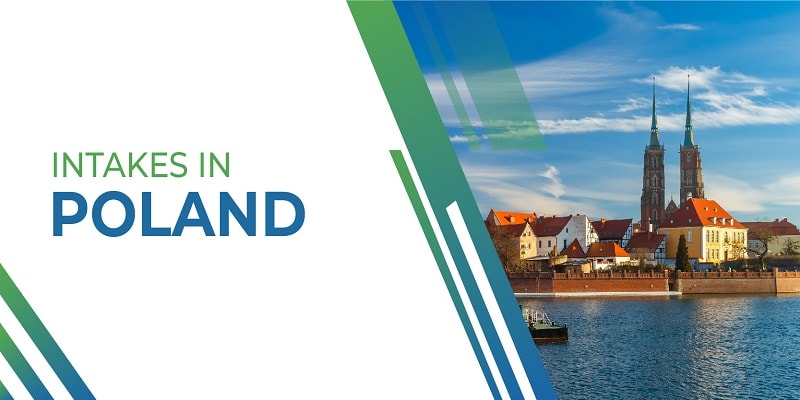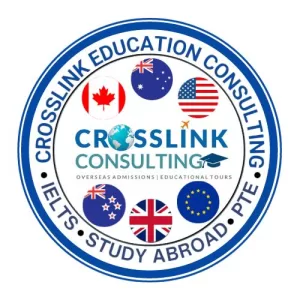Poland has emerged as an increasingly popular choice for Indian students seeking higher education abroad. Its affordable tuition fees, quality education, and a wide range of English-taught programs make it an attractive destination. Poland’s rich cultural heritage and vibrant student life further enhance its appeal. The country’s strategic location within Europe provides easy access to other European nations, offering valuable exposure and networking opportunities. Moreover, Poland’s welcoming atmosphere and growing Indian community create a comfortable and supportive environment for international students. All these factors combine to make Poland a compelling choice for Indian students pursuing their academic aspirations abroad.

Visa-requirements in Poland
- Acceptance Letter: You will need an acceptance letter from a recognized Polish university or educational institution. Ensure you have been accepted into a full-time program.
- Financial Proof: You must demonstrate that you have sufficient funds to cover your tuition fees, living expenses, and other costs during your stay in Poland. This can be in the form of bank statements, scholarship confirmation, or a financial guarantee from a sponsor.
- Health Insurance: You must have valid health insurance coverage for the entire duration of your stay in Poland. This insurance should cover medical expenses and repatriation.
- Valid Passport: Your passport must be valid for at least three months beyond your
intended departure date from Poland. - Visa Application Form: Complete the visa application form, which you can typically
find on the website of the Polish embassy or consulate in your home country. - Passport-sized Photos: You will need recent passport-sized photographs that meet
the specifications outlined by the embassy or consulate. - Proof of Accommodation: Provide proof of accommodation arrangements during
your stay in Poland. This can be in the form of a rental agreement or a letter of
accommodation from your university. - Proof of Language Proficiency: Some programs may require proof of proficiency in
the language of instruction, typically English or Polish. Check with your university for
specific language requirements. - Poland study-visa without IELTS:
1. Some universities in Poland offer English-taught programs where the medium of instruction is English. In such cases, you may not need to provide proof of English proficiency. However, it’s essential to check the specific admission requirements of the university and program you are interested in.
2. Some universities and programs may accept alternative English language proficiency tests other than IELTS, such as TOEFL (Test of English as a Foreign Language) or Cambridge English exams (e.g., Cambridge Certificate in Advanced English – CAE). Check with the university to see if they accept these tests.
3. In some cases, you may be exempt from providing proof of English proficiency if you meet certain criteria. For example, if you completed your previous education in English or if your native language is English, you may not need to take a language test.
4. Some universities offer preparatory language courses for international students who do not meet the language proficiency requirements. Completing such a course can help you meet the language requirements for your desired program. - Criminal Record Certificate: In some cases, you may be asked to provide a criminal record certificate from your home country.
- Visa Fee: Pay the required visa application fee, which can vary depending on your nationality and the type of visa.
- Interview: You may be required to attend an interview at the Polish embassy or consulate as part of the application process.
- Biometric Data: Depending on your nationality, you may need to provide biometric data (fingerprints and a photograph) when submitting your visa application.
Some points to remember:
- Specific requirements and procedures can vary based on your nationality and the Polish embassy.
- Always consult the official website of the relevant Polish embassy for the most accurate and current information regarding student visa applications.
- It’s always a good idea to start the application process well in advance of your intended travel date, as visa processing times can vary.
- When planning to study in Poland, it’s advisable to start the application process well in advance to ensure you meet all the admission requirements and submit your application on time.
- Additionally, consider factors such as visa processing time and accommodation arrangements when planning your arrival in Poland.

Intakes in Poland
In Poland, the academic year is typically divided into two main intakes for international students:
- Winter Intake (October/November): This is the primary intake period for most programs in Polish universities. It starts in October or November and is the equivalent of the fall semester in many other countries. The application period for this intake usually opens several months in advance, typically in the early spring or summer.
- Summer Intake (February/March): Some universities in Poland offer a secondary intake for certain programs in February or March. This is particularly common for English-taught master’s programs and may provide an opportunity for students who missed the winter intake to apply for the upcoming academic year.
Some points to remember:
- It’s important to note that the specific intake periods and deadlines can vary between universities and programs.
- It’s crucial to check the admission requirements and deadlines for the specific institution and program you are interested in.
- Also, be aware that some highly competitive programs may only have one intake per year, typically in the winter.
Courses offered by Poland
- Engineering and Technology: Poland has a strong reputation for engineering and technology programs. You can find courses in fields like mechanical engineering, civil engineering, computer science, and information technology.
- Business and Management: Many universities in Poland offer business administration, management, finance, and marketing programs. Warsaw School of Economics is particularly renowned in this field.
- Medicine and Healthcare: Poland has several well-regarded medical universities. You can study medicine, dentistry, pharmacy, nursing, and other healthcare-related courses.
- Natural Sciences: Programs in biology, chemistry, physics, and environmental science are available at numerous universities.
- Humanities and Social Sciences: Polish universities offer a wide range of programs in history, sociology, psychology, philosophy, linguistics, and other humanities and social science disciplines.
- Arts and Design: If you’re interested in creative fields, you can study fine arts, graphic design, fashion design, or architecture in Poland.
- Language and Literature: Poland is a great place to study the Polish language and literature. You can also find programs in English language and literature, as well as translation and interpretation studies.
- Economics and Finance: In addition to business and management, Poland offers economics and finance programs at various universities.
- Law: You can pursue a law degree in Poland, which includes courses in civil law, criminal law, international law, and more.
- Education: Poland offers education-related programs for those interested in becoming teachers or pursuing careers in educational leadership and policy.
- Computer Science and Information Technology: The IT sector in Poland is growing rapidly, and there are numerous computer science and IT-related courses available.
- Tourism and Hospitality: With its rich history and beautiful landscapes, Poland is a popular destination for tourists. You can study tourism and hospitality management here.
- Environmental Science: As environmental concerns become more important globally, Poland offers programs in environmental science, sustainable development, and related fields.
- Agriculture and Agribusiness: For those interested in agriculture and agribusiness, Poland has programs in agronomy, food technology, and agricultural economics.
- International Relations: Poland’s strategic location in Europe makes it an interesting place to study international relations, diplomacy, and global politics.

Cost of living in Poland
The cost of living in Poland can vary significantly depending on the city you choose to live in and your lifestyle. Generally, Poland is considered to be a more affordable European country compared to many Western European nations. Here are some typical expenses you might incur while living in Poland:
- Accommodation: The cost of housing is one of the most significant expenses. It can vary greatly by location. Major cities like Warsaw, Krakow, and Wroclaw tend to have higher rents than smaller towns and cities. On average, you can expect to pay anywhere from 1,500 to 3,500 PLN per month for a one-bedroom apartment in a city center, with lower costs in suburban areas.
- Food: Grocery costs can vary, but in general, food in Poland is relatively affordable. A typical grocery bill for one person might range from 300 to 600 PLN per month. Dining out at restaurants can be reasonable as well, with an average meal in a mid-range restaurant costing around 40-80 PLN.
- Transportation: Public transportation in Poland is efficient and affordable. Monthly transportation passes in major cities can cost around 100-200 PLN. If you own a car, you’ll need to budget for fuel, insurance, and maintenance costs.
- Utilities: Utility costs can vary depending on the size of your accommodation and your consumption. On average, expect to pay around 250-400 PLN per month for utilities, including electricity, heating, water, and internet.
- Healthcare: Poland has a public healthcare system that is free for Polish citizens and residents. If you’re an international student or resident, you may need to purchase private health insurance, which can cost around 100-300 PLN per month.
- Education: If you’re an international student, tuition fees will vary depending on the university and program. Tuition for international students can range from 2,000 to 10,000 EUR per year, depending on the level of study and field of study.
- Entertainment and Leisure: Costs for entertainment, such as cinema tickets, gym memberships, and cultural events, are generally reasonable. Budget around 100-300 PLN per month for leisure activities.
- Miscellaneous: Other expenses, such as clothing, personal care items, and unforeseen costs, can vary widely based on personal preferences and needs.
Some points to remember:
- It’s important to note that these are average costs, and your actual expenses may be higher or lower depending on your lifestyle choices and location within Poland.
- Additionally, exchange rates can impact the cost of living for international students and expatriates.
- Keep in mind that Poland is known for its excellent value for money in terms of education and cost of living, making it an attractive destination for students and expats alike.
- It’s advisable to create a detailed budget tailored to your specific circumstances to get a better understanding of your potential costs while living in Poland.
Hope the blog would have answered many of your questions and doubts. In case of any question, feel free to contact us at +91 7082531848, 9354065910
Team Crosslink wishes you all the best for your future!

Leave a Reply